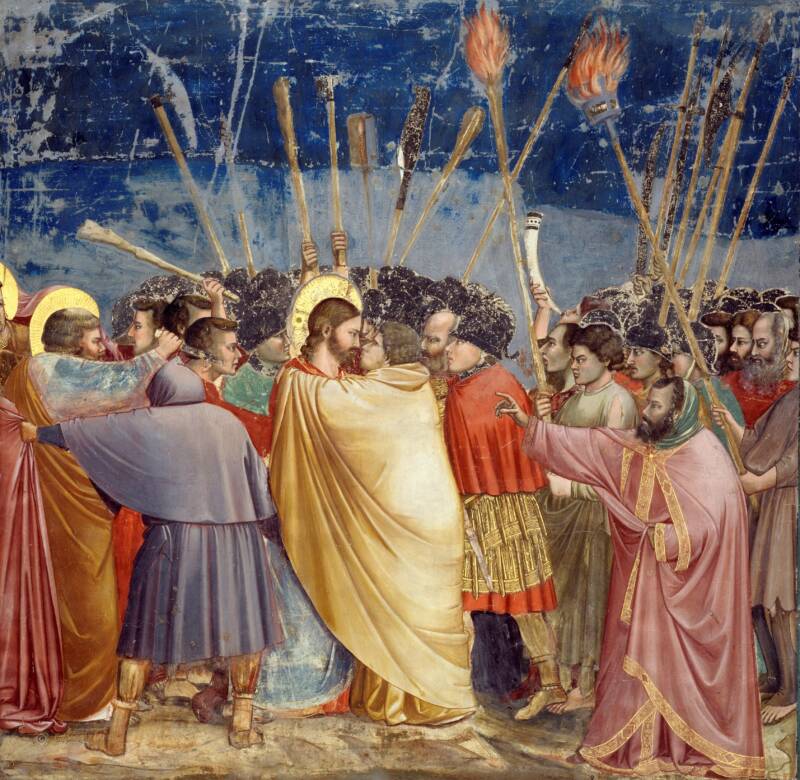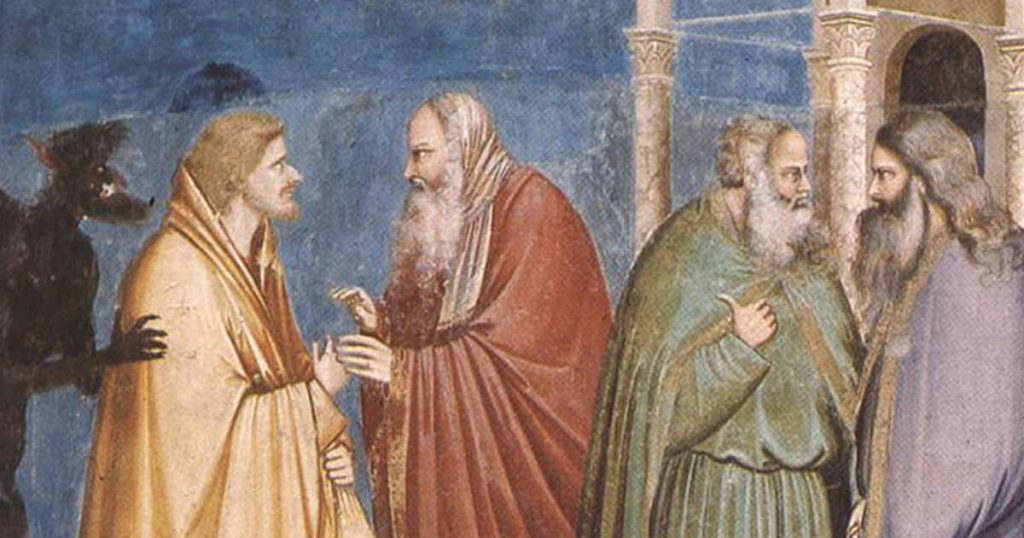
Every year, the gospels of Holy Tuesday and—most especially—Holy Wednesday give us, for our own personal reflections, the tragic story of Judas Iscariot whose name, in the Christian world, has become synonymous with the word “betrayal.”
The gospel of Holy Wednesday, in fact, recounts to us Judas’ betrayal of Jesus. The gospels (cf. Matthew 26:15, Luke 22:4) tell us that Judas betrayed Jesus for thirty pieces of silver; that he was given such an amount in exchange for betraying Jesus, leading some biblical commentators to conclude that Judas must have indeed betrayed Jesus for money.
Before we delve deeper into this matter of Judas’ betrayal of Jesus and its possible motivation, let us first look briefly at Jesus’ call of his disciples and locate Judas and his place in the group of the Twelve.
In Mark 3:13, the gospel says: “Jesus went up to the mountain and called to him those whom he wanted, and they came to him.” In another version of the same text, it says that Jesus “called to him those whom he desired.”
Jesus chose/called/wanted/desired the Twelve; he chose/called/wanted/desired each of them; he chose/called/wanted/desired Judas Iscariot.
When we apply this specifically to Judas, it means that Judas was not chosen and called arbitrarily, at random. He was chosen and called not because there was nobody else to choose; instead, he was chosen by Jesus deliberately. Jesus “chose” him personally.
Likewise, Judas was the “treasurer” or the “econome” of the community of the Twelve. For Jesus to give him such a position means that Jesus had a great amount of “trust” in him. You would not entrust the money of the community to someone whom you did not trust personally or who was untrustworthy!
But did Judas really betray Jesus for money? I do not intend to enter into the whole debate of what prompted Judas to do what he did, of what truly motivated him to betray Jesus—something that only Judas and God knew since only God could probe the human heart, the heart of Judas in this particular case.
In fact, it is for this reason that the Catholic Church has never condemned Judas to hell, aside from the fact that the Church does not really have the competence to condemn anyone to hell. However, if Judas betrayed Jesus for money, should he not have felt happy and gone away when he received his monetary reward from the chief priests and elders? Why did he feel remorse and why did he eventually hang himself to death?
Matthew 27:3 provides us a “glimpse” of the answer: “When Judas, who had betrayed Him, saw that He [Jesus] had been condemned, he felt remorse and returned the thirty pieces of silver to the chief priests and elders.”

What drove Judas to return the money to the chief priests and elders was when he saw that Jesus was condemned, and that he was an accomplice in his teacher’s imminent death. This gives us an idea that most probably Judas did not wish Jesus to die, that despite him “selling” his master for thirty pieces of silver, he really did not intend him to die.
As is obvious to those who have studied the gospels, the disciples of Jesus who constituted the community of the Twelve followed Jesus for various reasons, some of which were impure and selfish.
It is true that James and John left everything (their father, their boat, their livelihood) and followed Jesus (cf. Matthew 4:22, Luke 5:11), but their supplication for a “place” right beside Jesus in his Kingdom, narrated in Mark 10:37, reveals the obnoxious motivation for their sequela Christi (following of Christ).
In Matthew 20:20-21, such a hideous request for the “best” place in God’s Kingdom came from their mother who personally asked Jesus for it. Likewise, after telling Jesus that they had left everything to follow him, Peter asked: “What then will be there for us?” (Matthew 19:27).
On the part of Judas, he might have followed Jesus because, having looked at him primarily as a political messiah who could liberate Israel from the hands of the Romans, he hoped to benefit from his association with Jesus by being among the ruling elite in Jesus’ forthcoming Kingdom.
But in his months of being with Jesus and the rest of the disciples, listening to Jesus’ teachings about “turning the other cheek” and forgiving one’s enemies and praying for those who persecute them, and about the “lilies of the field”, among others, Judas must have grown tired of waiting for the coming of God’s Kingdom and impatient with the “slowness” of its advent and inbreaking in Jesus’ ministry.
And so, Judas must have thought that—and here we are simply entering into pure human conjectures—if he would “provoke” Jesus by doing something tragic, drastic and desperate, like “selling” Jesus to those who wanted him dead, God, whom Judas thought would never allow his Son to be harmed, and who therefore would be forced to protect Jesus from his enemies at all cost, would consequently send his angels from heaven to fight the Romans and their local collaborators—thus triggering a “revolution.”

In Judas’ human calculation, God would smite his enemies and finally deliver Israel from the dominion of the Romans. There would be a free Israel, and Judas would be among the new reigning power.
Yet, as they turned out, things did not happen according to how Judas “planned” or “calculated” them. Jesus did not fight for his life; he did not even resist his arrest. God did not intervene when his Son was arrested and ill-treated; he did not send his angels from heaven to defend his Son from those who wanted to get rid of him. There was no “revolution” that Judas expected. And all Jesus did was surrender himself to the Father who was “silent” throughout his agony on the cross and die forgiving his enemies.
Perhaps, Judas could not accept that his plans failed, and, worst, that his human miscalculations caused the death of his master whom he probably did not want to die. And so, filled with bitter tears of self-reproach, he hanged himself.
We may now go back to the question that we have raised above: Did Judas betray Jesus for money?
Most probably not! Judas must have done what he did out of his desire to “provoke” Jesus, to “force” God’s hands and instigate the coming of his Kingdom by handing Jesus over to his enemies.
Judas miscalculated Jesus; he miscalculated God. Instead of allowing himself to be re-created in the image and likeness of God in and through his Son, he tried to create an image of God according to his own miserable image of himself; he tried to create an image of God according to how he wanted God to be God for him. He did not allow God to be God; he did not allow Jesus to be who Jesus was and should be. He followed Jesus for the wrong reasons, and he wanted Jesus to fulfill his unfulfilled dreams in life, his unfinished business in life.
This was his sin, and I suspect this is also the sin of most of us: Instead of allowing ourselves to be created anew in God’s image and likeness, we try to create our own image of God based on our own personal interests.
In fact, as we grow we tend to accumulate and keep different images and concepts of God, many of which are false, distorted and erroneous, and we keep them simply because they justify our selfishness and mediocrity, our shallow and skin-deep spirituality, our erroneous philosophies and ideologies in life.
We create our own image of God that is soothing and gentle, an image that does not require us to change our ways and abandon our immaturities. In our attempt to create a God according to our image, we create a God who comforts us in our afflictions but not a God who afflicts us in our comforts.
Father Salvador G. Agualada Jr., CMF, a Filipino Claretian priest, finished his doctorate in Dogmatic Theology at the Pontifical Gregorian University in Rome.
Source: Licas Philippines
0 Comments